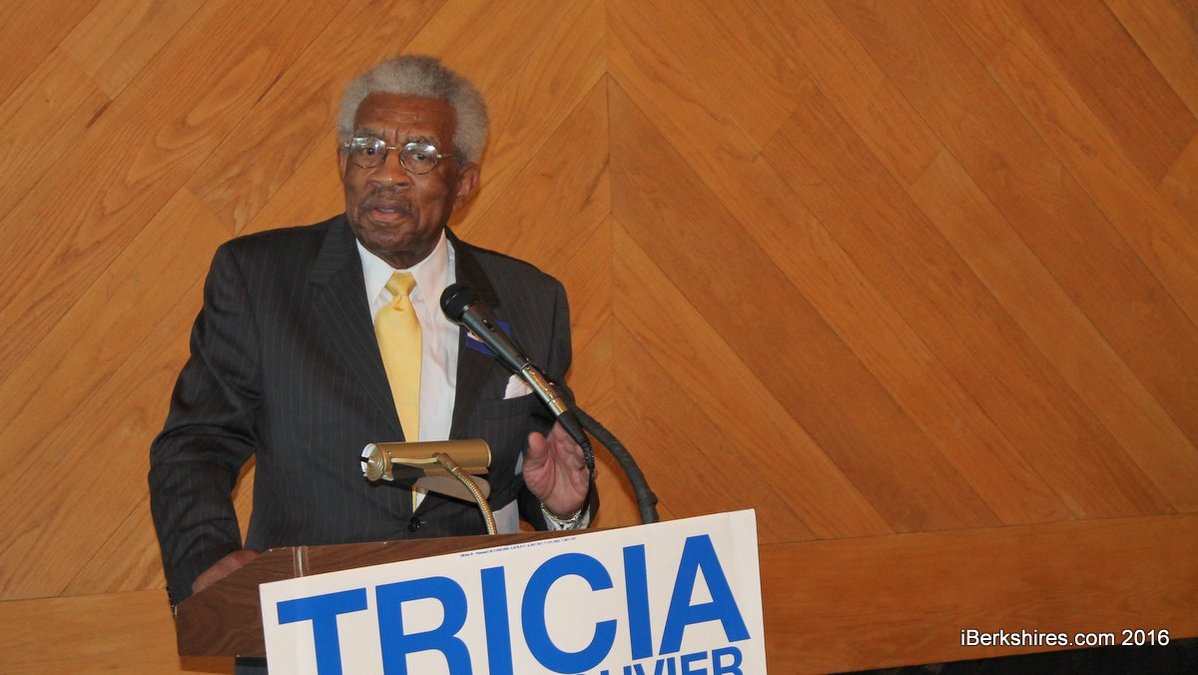Peering into the 11th Hampden Primary Race…

Swan’s 11th Hampden District, in dark brown, includes the heart of Springfield. (via malegislature.gov)
By the time the Massachusetts legislature is sworn in next January, three of Springfield’s members of the House of Representatives shall have been serving for less than three years. Two new reps from the city were elected two years ago and in January a third will join them, replacing retiring rep Benjamin Swan, currently the longest-serving resident in the legislature.
Unlike the teeming races of 2014, the Democratic primary for the 11th Hampden District, which includes the historical heart of the city’s black community, has not drawn as much notice. A debate WWLP aired on Tuesday was a rare window into a race that has been dominated by traditional, even arcane political strategy and longstanding relationships.
The shuriken-shaped 11th Hampden in Springfield’s geographic center encompasses much of the Bay, McKnight, Old Hill and Upper Hill neighborhoods, dipping into East Forest Park, East Springfield Forest Park and Pine Point. Swan has represented the district since winning a special election in 1994.
Political newcomers Kenneth Barnett and Benjamin Swan, Jr., perennial candidate Larry Lawson and longtime city councilor Bud Williams are competing for the Democratic nomination.

Rep. Ben Swan in June at colleague Tricia Farley-Bouvier’s reelection kickoff. (via iberkshires.com)
Running less than 30 minutes, WWLP’s Rich Tettemer posed identical questions to all candidates with no follow up or challenge to their answers. While the debate provided some contrast among the candidates, there was little exploration of four men’s differences and qualifications and how they would fill the gap the elder Swan is leaving.
While the retiring Swan does not crown the food chain in the clubby House of Representatives, his history as a civil rights icon—he once ran the Springfield NAACP—and representation of a challenged area granted him a modicum of respect on Beacon Hill. His predecessor, Raymond Jordan, had been a formidable figure in the legislature and remains one of the most powerful African-American political figures in Springfield.

Kenneth Barnett (via barnettforstaterep.com)
Williams, who has served in the City Council since 1994 save a two-year interlude six years ago, suggested he could “hit the ground smoking” in Boston. But while his populist pitch of “jobs, jobs, jobs” for city residents might resonate among some, it suggested less, not more understanding of Beacon Hill, whose leaders appreciate members with bigger-picture perspectives.
Lawson pointed to public safety, diminished services and economic development as key issues.
“If we want to build a world-class city, we must begin by making it safe,” he said.
Swan, Jr., a consultant who has worked for both Smith & Wesson and MassMutual as a mechanical designer and information technology systems analyst, pitched himself as having the skills necessary to address the economic development needs of the district.
“One of the things I say is all, all of us, should exercise ownership of our community,” Swan said, adding that he did and would as rep.
Like Lawson, Barnett put public safety at the top of his list. Specifically he called for expanding the C3 policing initiative to the Mason Square area.
“As long as we’re working together with the police department, we’re they’re visible and available that we do better,” Barnett said. He also widely praised Attorney General Maura Healey’s crackdown on copycat guns, while the other candidates offered more of a wait-and-see approach.
The race has become somewhat tense in recent days as voters focus on the Thursday primary and the two frontrunners, Swan and Williams, traded barbs over illegaly placed signs and endorsements.
But it was Barnett, arguably the freshest face, who blasted the younger Swan—and more subtly Williams. Without naming either, Barnett referenced the apparent Swan’s apparent decision to run after his father had already pulled papers and Williams tantrum following the Swans’ move.
“It must be said, my purpose for running for this office is mine and mine alone.” Said Swan adding, as he has elsewhere, that his name is not a qualification and he is running on his own merits.
Bud Williams (via springfield-ma.gov)
But aside from some banter on charter schools and guns, both critical issues to the district into which the debate did not dig deeply, there was little policy development from the candidates.
Beyond the debate, only Swan has offered a concrete platform. He released an agenda earlier in the year and has mentioned other legislative pursuits such as urban farming and early childhood education.
None of the candidates’ proposals will sail through the House of Representatives or the legislature quickly. Like many reps departing this year, many of the elder Swan’s goals will go unrealized as he retires. Contra his assertion about starting off quickly once at the State House, Williams, whose forte is community ubiquity—for better or for ill—not policy, would find being one of 160 far less advantageous than one of 13.
The candidates’ legislative dreams might be dashed by the cruel vagaries of the State House. Yet, it is helpful, indeed, crucial to know the individuals who would represent the vulnerable population in this district…and how.
Watch the WWLP-hosted debate below.

